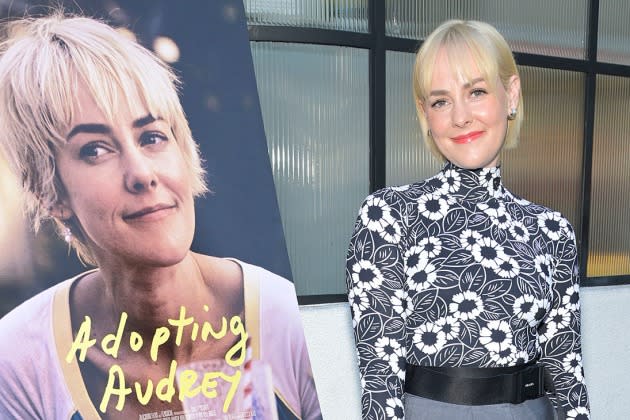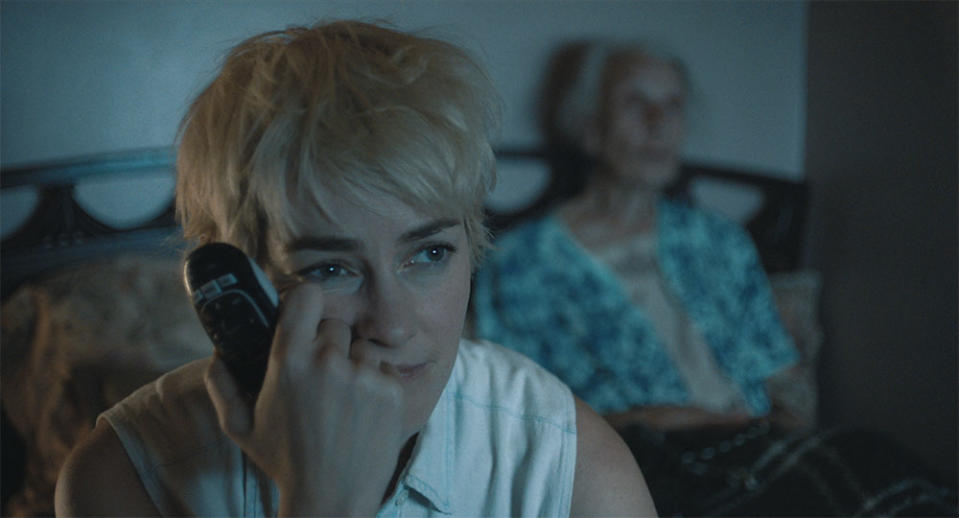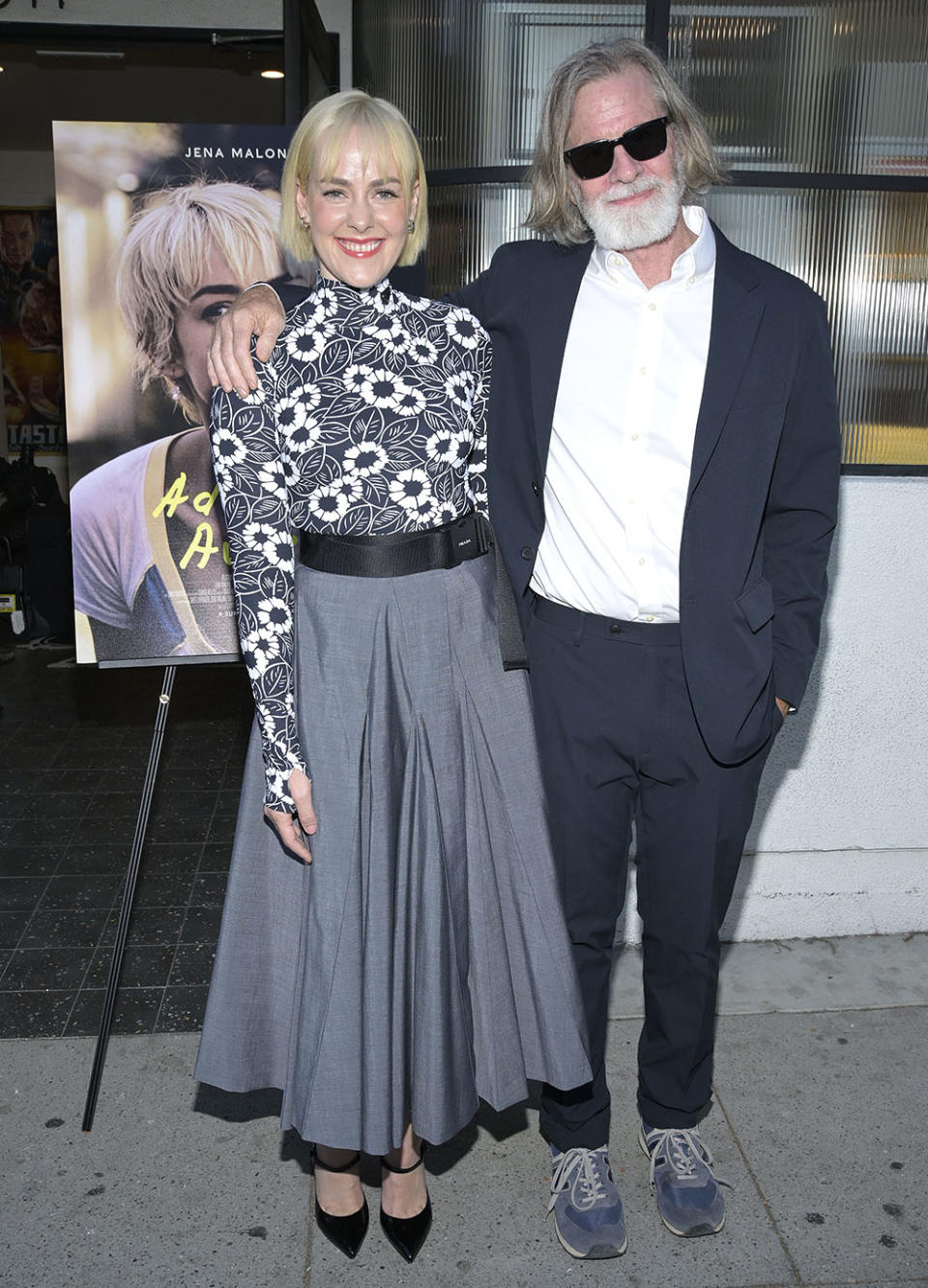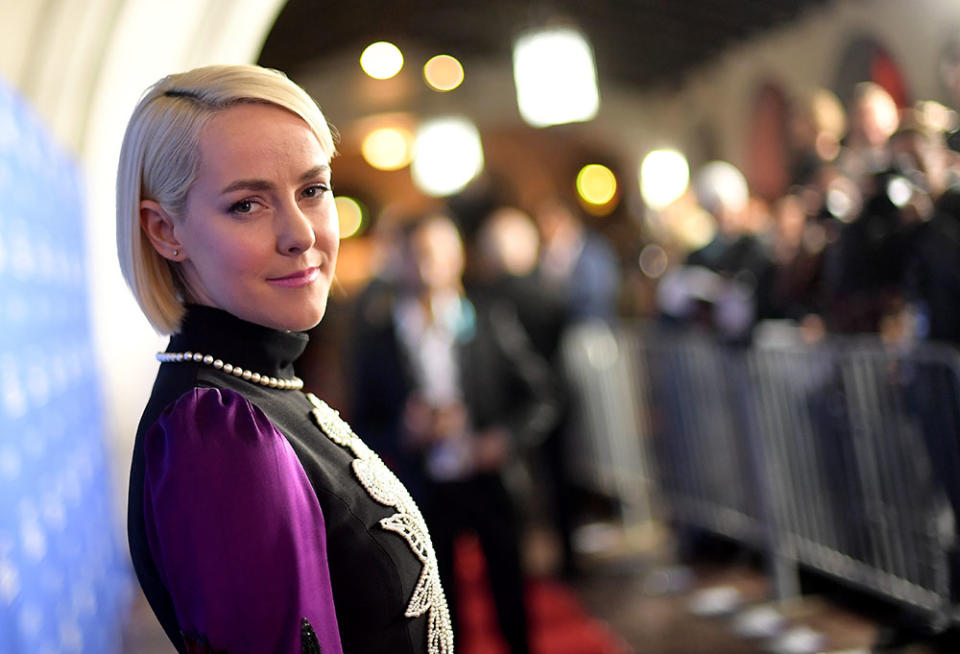Jena Malone on Coming Out as Pansexual and Why Her New Film Marks Her “Best Performance to Date”
- Oops!Something went wrong.Please try again later.
- Oops!Something went wrong.Please try again later.
- Oops!Something went wrong.Please try again later.

Very few, if any, actors have sprinted out of the blocks like Jena Malone.
After debuting in a Michael Jackson music video, the Nevada native starred in directorial debuts for Anjelica Huston and Goldie Hawn, shared the screen with Jeff Bridges and Frances McDormand, played a young Jodie Foster, got caught between Julia Roberts and Susan Sarandon, did a period piece with Glenn Close, got weird with Jake Gyllenhaal in a cult classic, played a ferry girl for Anthony Minghella, charmed an emo Hayden Christensen, snagged an ensemble part in a starry indie with Don Cheadle, Ryan Gosling and Michelle Williams, and tested the convictions of Emile Hirsch and Kieran Culkin.
More from The Hollywood Reporter
'Ozark' Star Alfonso Herrera Discusses That Shocking Premiere and Teases Zack Snyder's 'Rebel Moon'
Cary Elwes, Corey Stoll Join Zack Snyder's Sci-Fi Fantasy 'Rebel Moon' (Exclusive)
And she did it all by her 18th birthday.
Malone has continued working at a breakneck pace over the years, eventually graduating to franchise fare (The Hunger Games, Batman v Superman: Dawn of Justice) while never straying far from her indie roots (The Neon Demon, Lorelei). Now 37, Malone has made a fairly bold statement about her newest film — Adopting Audrey from writer-director M. Cahill — calling it “hands down her best performance to date.”
The Vertical Entertainment release, out Aug. 26, casts Malone as the title character and follows her as she navigates a choppy time in her life, having just been fired from her seventh job in two years while remaining estranged from her family. After falling down an online rabbit hole, she discovers adult adoption and decides to give it a go. She soon finds an adoptive family whose dysfunction mirrors her own, allowing her to form an unlikely bond with the misanthropic patriarch, played by Robert Hunger-Bühler. The film also stars Emily Kuroda, Will Rogers and Brooke Bloom.
The Hollywood Reporter caught up with Malone on Tuesday over Zoom to talk about how she prepared to play a naturalistic part like Audrey, speaking the same creative language with frequent collaborator Zack Snyder on his new film Rebel Moon, and why the mixed responses to her last film Antebellum don’t sting too badly. She also opened up about coming out as pansexual on Instagram last weekend and the support she has received from her family.

How are you feeling about online interviews these days, do you like it or do you prefer in-person?
There’s pluses and minuses to both. It’s nice that I can do this from my own home and still hang out with my cats. And I have all of my own snacks. It’s fun but it’s also fun meeting people. There’s something to be said for face to face contact, you know?
So true. You posted that this movie is “hands down your best performance to date.” Was that something that you felt as it was happening or only after you watched the final product?
I knew I was onto something special, but you always have to feel like that when you’re working. I mean, you don’t always, but one would hope that you feel like you’re doing something that is great and new to you. But it was really when I watched the first cut of it and saw the whole film together that I realized. Before I did this film, I had done a long string of character work, which has sort of been where I’ve just wanted to explore, with wigs and accents and different time periods and all sorts of craziness. It felt really exciting.
I realized that I hadn’t really been myself or been approached to take on a character from a deeply naturalistic perspective since I was a teenager. That felt scary to me and then I knew I really needed to do that. I needed to see what that was about because I felt like I could learn something in that space. Sometimes I tend to shy away from deeply naturalistic stuff because it’s so nice to hide behind characters. It’s so liberating. When you’re an actor [or someone with femme energy], there are only certain places where you can live, there’s only certain conversations you can fulfill. I have always taken the path of doing crazy characters that have allowed me to transcend those minimal conversations and force new ones to emerge. [This film] gave me confidence to explore different aspects of myself.

How did you find who Audrey was?
One finds characters in a thousand ways and it’s never as linear as you would like. It’s not proven science, it’s not like, “Combine this chemical and this chemical to always make this.” I feel like I developed who she was before I even got on set. I worked deeply with Mike, and the script felt so resonant to me. I felt like I knew her. I have family members who are literally Audrey. Then I just allowed her to emerge on set and I tried not to push her in any direction that felt linear. I allowed whatever happened in the moment and hoped, God willing, it would work. Luckily, I had a director that really understood that process and allowed a lot of different things to emerge. Then we have the safety net of the editing room.

I’ve been reading so much about actors and their processes, especially lately as the conversation around method acting comes up so often. There are many who use it and just as many who criticize it as a way for some actors to excuse being an asshole on set. What’s your take?
It’s funny because I’m an untrained actor. I am purely a put my toes in the water, learn how to swim type. I learned by watching and trying and relying heavily on instinct. I’ve developed tools but they’re probably janky. If I ever went to a class they might say to me, “Really? That’s how you do it?” If you rely heavily on instinct then you protect it at all costs because it’s such an ephemeral thing. I don’t think anyone should be an asshole at any point but yet we are all assholes in a way. We all have those moments of stress, that’s part of our humanity. We can’t just kick it under the rug and pretend it doesn’t exist. If we want to explore all of humanity then we can’t really say that you can’t be an asshole because part of that exploration process is holding space for whatever comes.
That’s why I don’t really talk about being a method actor or this or that. I literally just hold space for whatever comes. If I’m being asked to kill a chicken, I should go learn how to kill a chicken because that’s going to protect my instinct and help me be more demonstrative in the process of embodying it. But if I’m being asked to climb Mount Everest in a film, I may have to do something else. There are so many variables and you can never always know how to do exactly what the character is asking of you. Just hold the space for whatever comes.

Let’s go back to Audrey. She’s a fascinating character in that she’s a really good human being but she’s not so good at doing all of the things commonly expected of human beings, like holding down a job, paying bills, knowing exactly who you are and where you’re going. But she’s very resourceful and compassionate. What parts of her resonated for you?
You touched on such a giant part of her, which is the resilience. That is 100 percent a byproduct of being born during grind culture and where it’s sort of that DIY or death. We can look on YouTube and learn how to be or do anything. We can be a master of anything, but yet somehow, what are we a master of? Ourselves? It’s a very limiting thing when you’re only talking about self-reliance and how resilient you can be. I’ve also in that boat and while I feel it’s really important, it’s also been important for me to step out and try anything new. Just say yes and try.
I loved that part of her. When you are existing in that sort of rootless aspect of society where it’s so easy to feel like you don’t have what everyone else has, it’s easy to feel jaded and heavy. It can feel like a burden to not fit in correctly. I’ve known so many humans in my life and have felt that way myself. It doesn’t have to beat you down because maybe rootlessness is what you want and that’s OK. It was important to me that Audrey not be jaded, that she was still optimistic because it solidified her choice in embracing that part of herself that maybe society hasn’t allowed us to embrace in a fuller, more complete way.
The final thing that I love about her and also what I love about the film and all of its characters is how it asks the question if self-reliance is all you’ve known, what else is there to be a human? What do we need? It invites more conversations about community care and that’s something we haven’t gotten to explore and it’s sort of desperately needed. It doesn’t hit you over the head but it’s a very subtle part of the story and done very simply. I loved that.
Community care is needed now more than ever …
Yeah and it’s amazing that this film is coming out now and that they waited to release it because the gift of what these last three years have brought us is that while there are a lot of cracks under the surface and that may feel dangerous, scary and hard to manage, it’s beautiful that we get the chance to reimagine how we want to be.
It’s also coming out now at a time when the theatrical marketplace is still rebounding. It hasn’t gotten back to where it was and it’s been even more challenging for independent film. How are you feeling about the state of movie theaters?
We’re in a bit of a conundrum. We can’t go back to how things were. That’s part of the human existence because we always want to, we’re deeply nostalgic, but it doesn’t mean that there’s a way back. My grand scope is that in the ’20s when Vaudeville theaters started dying, they became something else that became something else that turned into Barnes and Nobles or shopping malls or what have you. But some of those theaters were kept around because the theater itself is beautiful. That may happen to the rest of the independent theaters but they will never go away forever. Look at the tiny bookshops that still exist.
They will always be around but the may never be the biggest, most heralded destinations in the town square. It may just require an adventure to get there. I don’t mind if independent films and cinemas kind of become a little bit more of an offshoot because it’s always been that. It may be harder to find but we are never going to stop wanting to watch stories. That will never stop. That desire will always be there. It just may change a bit.
Have you been back to the movie theaters?
Oh yeah.
What was the last movie that you saw?
Everything Everywhere All at Once. My favorite film. I love that film.
Audrey is obsessed with viral videos. What does that say about her and are you someone who gets lost like that online?
I love when a film can reveal a new part of humanity that every single person is experiencing. Now, it’s not such a dirty secret and it’s just part of society in that everyone has a digital content [platform] that they reach for to get different levels of disassociation as a coping mechanism. It’s either they want to zone in, zone out or look completely differently at their world. Every single human has that — even kids who can form these deep, emotional bonds to digital content that provides a kind of metaphysical tool that’s not, like, meditation. But what is it? It might just be disassociation.
I loved witnessing that part of Audrey as she zones out on animal videos through just the sweetness and weirdness of it. But, yes, I reach for reality TV when I want to zone out or when my mom brain is deeply fried and I just want to watch people getting coffee, doing activities and going on dates — things I don’t get to do anymore.
What is your go-to reality series?
I like The Bachelorette. I watch all the matchmaker ones and all the island ones. There are so many.
You brought up dating and forgive me for going here now but it made me think of your Instagram post from last weekend when you came out as pansexual. Can you tell me more about how you arrived at that and how it felt to come out?
It felt so nice. I’ve been thinking about it for a while. The sexual journey is so beautiful. I mean, all of the identity journeys are so cool. I feel like I’m a little bit late to the game in being able to have less shame. I’ve been loving the process of learning more about myself and others through different terms that open windows, those windows then turns into doors and then I arrive at a place to find all this cool stuff out there.
It’s a part of humanity now to have all these ceremonies of exclamation around coming out and renouncing [an identity] and celebrating that space for yourself. It’s a really sweet, human experience. I love getting to learn more about myself no matter the age or my experience.
In the comments section, your sibling posted that you are a family of queers, which is fascinating because I know you were raised by two mothers. How has your family experience enhanced your understanding of sexuality and your journey?
I have a really supportive family and they’ve been that way for whatever, however or whoever I am or what I bring to the table. It’s all exciting and wonderful and perfectly great. But yeah, my sister is queer and I grew up with two moms who were lovers and then they split. My mom sort of became hetero again, mostly through an understanding of Christianity. And then my god mom married her partner of 17 years now. So, I have three moms and my dad who has been a hetero man all his life. I have the whole spectrum. It’s nice to be able to have these different types of conversations with everyone. I feel really blessed to have an accepting family.
Everyone should have that.
And if you don’t, you can get it like in Adopting Audrey. If you do not have a supportive family or loving adult people around you, go and find that honey!
Speaking of families, you’re back at work with one of your most frequent collaborators in Zack Snyder. In a recent interview you said that you’re doing something you’ve never done before in Rebel Moon. What does that mean and how is it going?
You know, I can’t say a word. It’s funny thing or like an inside joke where the journalist always ask, “What can you say?” and the actor always says, “I can’t say anything.” But I can’t. Zack always asks me to do something I’ve never done before and one of the biggest gifts that’s emerged from working for as long as I have is the collaborations I’ve gotten to form. Whether it was with Nic Refn or Zack Snyder or Carter Smith, who we just did this film Swallowed together after doing The Ruins. I love building a language with my directors. It’s my favorite thing. I’m so deeply fortunate that Zack and I speak a language that feels creative and supportive and exciting.
Going back to Instagram. I love how so much of what you post is meant to welcome conversations and dialogue and evolution and you seemed to be doing that with your post about Antebellum, a movie that divided critics. Were you surprised by that?
You can’t just make a good film. It also has to be made at a time where that movie can be seen and an audience wants to see it. We made a beautiful film. It was released in a time that it was so hard for audiences to witness that. So it’s a conundrum but I think it’s fine. For me, you have to believe in the eternal shelf life of a film and believe that the film will be seen and affect the people that it’s meant to affect and be seen by them in its own time. It would be one thing if I said, “I hate that movie,” or, “They didn’t do a good job and I’m glad that no one saw it.” But that’s not the case.
It’s a really beautiful film and it’s really moving. It’s really disturbing. It just came out at a time when, collectively, it felt brutal to be having that same conversation. We were in a very delicate time. And that’s OK. I also love knowing that people somehow, collectively, know ourselves enough to make that choice together, like, “Nope, that’s not the conversation we need to be having. Thank you very much. What else can we have? Maybe more comedy.” We just never know.
I read that you were hard at work on a short film that you are directing from your own script? What’s the latest and do you have any plans to do a feature at some point?
I’m deep in writing. If I spend the next 10 years just writing and experimenting with that, I’ll be right on track for when my son’s in high school and I can have some more space where I can dedicate six months or eight months to, you know, leading a ship, crafting a film, directing a film. It takes a time commitment and my priorities are just in a different space right now. [My son and I are] at the beginning of our elementary school journey and I want to be so present for that. The gift of that is that I have these random five to six hours every day during the school day where I can come home and develop this practice. I wrote this short that I really love and I’m in the middle of writing two features so I’m just going to keep going. There’s no rush.
Interview edited for length and clarity.
Adopting Audrey releases on Aug. 26.
Best of The Hollywood Reporter

